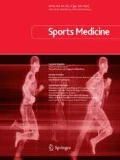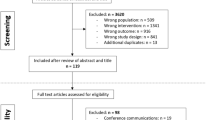Abstract
Research in football for a long time has focused on the physical nature of fatigue as opposed to its mental aspects. However, since 2016, six original articles have investigated the effects of induced mental fatigue in football on isolated physical, skill and decision-making performance tests, along with physical, technical and tactical performance outcomes in small-sided games. Whilst these studies have overall shown a negative impact of mental fatigue on task performance, this current opinion aims to critically examine the methodological approach to this problem, most notably the lack of ecological validity when inducing mental fatigue and the present approach to measuring mental fatigue using visual analogue scales (VAS). It is suggested that future research on mental fatigue in football may benefit from the use of surveys/interviews to understand the true cognitive demands of elite football players. Additionally, future research should aim to reduce the reliance on using VAS to measure mental fatigue as results from this tool may be confounded by several response biases. In conclusion, this article highlights the need for mentally fatiguing tasks that adequately represent football-associated mental fatigue and assessments of mental fatigue that minimise the confounding effect of response bias.
Similar content being viewed by others
References
Smith M, Thompson C, Marcora S, Skorski S, Meyer T, Coutts A. Mental fatigue and soccer: current knowledge and future directions. Sports Med. 2018;5:1–8.
Walsh V. Is sport the brain’s biggest challenge? Curr Biol. 2014;24:859–60.
Williams AM. Perceptual skill in soccer: implications for talent identification and development. J Sports Sci. 2000;18(9):737–50.
Smith M, Coutts A, Merlini M, Deprez D, Lenoir M, Marcora SM. Mental fatigue impairs soccer-specific physical and technical performance. Med Sci Sports Exerc. 2016;48:267–76. https://doi.org/10.1249/MSS.0000000000000762.
Smith M, Fransen J, Deprez D, Lenoir M, Coutts AJ. Impact of mental fatigue on speed and accuracy components of soccer-specific skills. Sci Med Footb. 2017;1:48–52. https://doi.org/10.1080/02640414.2016.1252850.
Smith M, Zeuwts L, Lenoir M, Hens N, De Jong LMS, Coutts AJ. Mental fatigue impairs soccer-specific decision-making skill. J Sports Sci. 2016;34:1297–304. https://doi.org/10.1080/02640414.2016.1156241.
Coutinho D, Gonçalves B, Travassos B, Wong DP, Coutts AJ, Sampaio JE. Mental fatigue and spatial references impair soccer players’ physical and tactical performances. Front Psychol. 2017;21(8):1645. https://doi.org/10.3389/fpsyg.2017.01645.
Badin O, Smith M, Conte D, Coutts AJ. Mental fatigue: impairment of technical performance in small-sided soccer games. Int J Sports Physiol Perform. 2016;11:1100–5. https://doi.org/10.1123/ijspp.2015-0710.
Coutinho D, Gonçalves B, Wong D, Travassos B, Coutts AJ, Sampaio J. Exploring the effects of mental and muscular fatigue in soccer players’ performance. Hum Mov Sci. 2018;58:287–96.
Smith M, Marcora S, Coutts A. Mental fatigue impairs intermittent running performance. Med Sci Sports Exerc. 2015;47:1682–90.
Watson D. Correcting for acquiescent response bias in the absence of a balanced scale: an application to class consciousness. Sociol Methods Res. 1992;21:52–88.
Lorist M, Boksem M, Ridderinkhof K. Impaired cognitive control and reduced cingulate activity during mental fatigue. Brain Res Cogn Brain Res. 2005;24:199–205. https://doi.org/10.1016/j.cogbrainres.2005.01.018.
MacDonald A, Cohen J, Stenger V, Carter CS. Dissociating the role of the dorsolateral prefrontal and anterior cingulate cortex in cognitive control. Science. 2000;288:1835–8.
Araújo D, Davids K, Bennett S, Button C, Chapman G. Emergence of sport skills under constraints. In: Williams AM, Hodges NJ, editors. Skill acquisition in sport: research, theory and practice. London: Taylor & Francis; 2004. p. 409–33.
Phillips E, Davids K, Renshaw I, Portus M. Expert performance in sport and the dynamics of talent development. Sports Med. 2010;40:271–83.
Travassos B, Araujo D, Davids K, Vilar L, Esteves P, Vanda C. Informational constraints shape emergent functional behaviours during performance of interceptive actions in team sports. Psychol Sport Exerc. 2012;13:216–23.
Pinder RA, Davids K, Renshaw I, Araújo D. Representative learning design and functionality of research and practice in sport. J Sport Exerc Psychol. 2011;33:146–55.
Lelis-Torres N, Ugrinowitsch H, Apolinário-Souza T, Benda RN, Lage GM. Task engagement and mental workload involved in variation and repetition of a motor skill. Sci Rep. 2017;7:14764.
Aliyari H, Kazemi M, Tekieh E, Salehi M, Sahraei H, Daliri MR, et al. The effects of FIFA 2015 computer games on changes in cognitive, hormonal and brain waves functions of young men volunteers. Basic Clin Neurosci. 2015;6:193.
Barrett S, McLaren S, Spears I, Ward P, Weston M. The influence of playing position and contextual factors on soccer players’ match differential ratings of perceived exertion: a preliminary investigation. Sports. 2018;6:13.
Zhao C, Zhao M, Liu J, Zheng C. Electroencephalogram and electrocardiograph assessment of mental fatigue in a driving simulator. Accid Anal Prev. 2012;45:83–90.
Ting P, Hwang J, Doong J, Jeng MC. Driver fatigue and highway driving: a simulator study. Physiol Behav. 2008;94:448–53.
Lal SK, Craig A. Driver fatigue: electroencephalography and psychological assessment. Psychophysiology. 2002;39:313–21.
Reeves CW, Nicholls AR, McKenna J. Longitudinal analyses of stressors, perceived control, coping, and coping effectiveness among early and middle adolescent soccer players. Int J Sport Exerc Psychol. 2011;42:186–203.
Lee K, Hicks G, Nino-Murcia G. Validity and reliability of a scale to assess fatigue. Psychiatry Res. 1991;36:291–8.
Orne M. Demand characteristics and the concept of quasi-controls. Artifacts in behavioral research. New York: Academic Press; 1969.
Kruger J, Dunning D. Unskilled and unaware of it: how difficulties in recognizing one’s own incompetence lead to inflated self-assessments. J Pers Soc Psychol. 1999;77:1121.
Widyanti A, Muslim K, Sutalaksana I. The sensitivity of galvanic skin response for assessing mental workload in Indonesia. Work. 2017;56:111–7.
Li K, Pan B, Gao Y, Ruan Z, Li T. A novel method to estimate oxygen saturation of the internal jugular vein blood. Int Soc Opt Photonics. 2016;9698:96981F.
Kahneman D, Tursky B, Shapiro D, Crider A. Pupillary, heart rate, and skin resistance changes during a mental task. J Exp Psychol. 1969;79:164.
Brownsberger J, Edwards A, Crowther R, Cottrell D. Impact of mental fatigue on self-paced exercise. Int J Sports Med. 2013;34:1029–36.
Baumeister J, Reinecke K, Schubert M, Schade J, Weiss M. Effects of induced fatigue on brain activity during sensorimotor control. Eur J Appl Physiol. 2012;112:2475–82.
Baumeister J, Reinecke K, Liesen H, Weiss M. Cortical activity of skilled performance in a complex sports related motor task. Eur J Appl Physiol. 2008;104:625.
Reinecke K, Cordes M, Lerch C, Koutsandréou F, Schubert M, Weiss M, et al. From lab to field conditions: a pilot study on EEG methodology in applied sports sciences. Appl Psychophysiol Biofeedback. 2011;36:265–71.
Baumeister J, Reinecke K, Cordes M, Lerch C, Weiß M. Brain activity in goal-directed movements in a real compared to a virtual environment using the Nintendo Wii. Neurosci Lett. 2010;481:47–50.
Britton J, Adult EEG. Clin Neurophysiol. 2016;31:76.
Vaeyens R, Lenoir M, Williams AM, Mazyn L, Philippaerts RM. The effects of task constraints on visual search behavior and decision-making skill in youth soccer players. J Sport Exerc Psychol. 2007;29:147–69.
Boksem M, Meijman T, Lorist M. Effects of mental fatigue on attention: an ERP study. Brain Res Cogn Brain Res. 2005;25:107–16. https://doi.org/10.1016/j.cogbrainres.2005.04.011.
Duncan MJ, Fowler N, George O, Joyce S, Hankey J. Mental fatigue negatively influences manual dexterity and anticipation timing but not repeated high-intensity exercise performance in trained adults. Res Sports Med. 2015;23:1–3.
Acknowledgements
The authors wish to thank Adam Beavan and Ruth Boat for editing and proofreading the article.
Author information
Authors and Affiliations
Corresponding author
Ethics declarations
Funding
No sources of funding were used to assist in the preparation of this article.
Conflict of interest
Chris J. Thompson, Job Fransen, Sabrina Skorski, Mitchell R. Smith, Tim Meyer, Steve Barrett and Aaron J. Coutts declare that they have no conflicts of interest relevant to the content of this article.
Rights and permissions
About this article
Cite this article
Thompson, C.J., Fransen, J., Skorski, S. et al. Mental Fatigue in Football: Is it Time to Shift the Goalposts? An Evaluation of the Current Methodology. Sports Med 49, 177–183 (2019). https://doi.org/10.1007/s40279-018-1016-z
Published:
Issue Date:
DOI: https://doi.org/10.1007/s40279-018-1016-z




